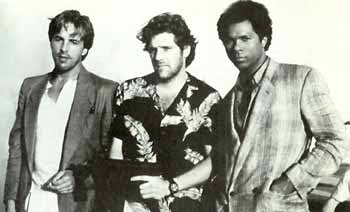Glenn Frey's passing brings back an interesting set of memories. I was never a big fan of the Eagles but Hotel California is one of those songs that is hard to get out of your head. Don Felder wrote the music, which to me is the most haunting part, but Frey and Don Henley are given more credit for the lyrics. Felder is a Gainesville native. He and Bernie Leadon both grew up in Hogtown and helped spawn a music scene that was second to none in the 70s, which included Tom Petty among others.
I remember as a college student "camping out" to buy $6 tickets for a Tom Petty concert, as it was expected to be sold out the first day. Petty was making his triumphant return to Gainesville, kicking off a new tour, and it was rumored Stevie Nicks would be joining him on stage, after their huge hit, Stop Draggin' My Heart Around, the previous year. Petty may have not been ready for the big stadiums like the Eagles, but he was sure to pack the 12,000 seat O'Connell Center.
When the Eagles came to town in the early 90s it was an entirely different story. Ticket prices had soared by then and you couldn't get a seat for less than $100. This was the Hell Freezes Over tour that saw the Eagles come back together, which Don Henley vowed would never happen. It turned out to be a smart marketing ploy, as they packed the University of Florida football stadium, despite many disgruntled fans who felt they were being gouged. Some hold the Eagles personally responsible for high ticket prices, as they were the first major band to cross this threshold.
Glenn Frey had tried to go solo in the 80s, penning a few songs popularized by hit movies and TV shows. He even popped up on Miami Vice in an episode built around Smuggler's Blues. But, his popularity faded pretty quickly, as did Don Henley's solo effort, which I guess is why the two got the big idea to bring back the Eagles in 1994. It was clear they would never achieve the same level of success they had in the 70s, but they could cash in on it with a grand reunion.
It worked out perfectly for them as there was a big yearning for these pre-disco era bands that hadn't been forgotten. The core of their fans were now middle-aged like themselves and could afford to spring for a big concert, unlike the college kids that supported them in the 70s. There was MTV for the young ones to tune into and see them "unplugged," not that this audiance would be overly interested in their music. The Eagles would have a hard time competing with Grunge, which was dominating the airwaves at the time.
Don Felder was fired in 2001. It seemed Frey and Henley wanted to take the Eagles back to their country roots, and there was no room for Don. He filed a suit against his former bandmates, reaching an undisclosed settlement, but the bad taste lingered for years. After all, he helped give the band its distinctive sound, never getting the credit he deserved.
Glenn Frey kind of disappeared himself. The Eagles haven't enjoyed a resurgence like other iconic bands have. There is no great call for their music on the radio. You don't even hear young groups drawing on their music in any significant way, like they do other bands from the same era. There are few persons covering Eagles tracks.
The Eagles continued to play in their diminished form through 2015. They were due to be honored at Kennedy Center at the end of the year, but Glenn's remaining bandmates asked for the honor to be postponed so that Frey could join them. Nevertheless, Miranda Lambert offered this version of Desperado, which is probably his signature song. It will make this year's event just that much more poignant.


Comments
Post a Comment